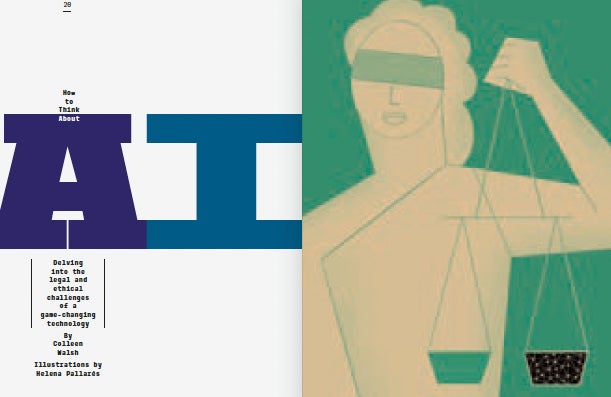Who knew?!
What a surprise and delight it was to read in the Summer 2023 issue that the International Law Moot that was organized by the International Law Club in 1960 has morphed into the Philip C. Jessup International Law Moot Court Competition with 600 teams in 85 countries! Our hopes at that time would have been amply satisfied if it had become merely a tradition at HLS.
Ronald D. Levin ’61
President, Harvard International Law Club ’60-’61
Sarasota, Florida

Don’t privilege robot talk
Kudos to Colleen Walsh for a timely and insightful dive into generative artificial intelligence and the looming challenges posed by AI’s fast-moving and potentially harmful impacts in “How to Think About AI: Delving into the legal and ethical challenges of a game-changing technology” (Summer 2023).
One simple, constructive legal and policy reform that seems necessary and warrants further discussion is making it mandatory for transmissions of generative AI to include a disclosure that its content is AI-created and not by a human. Label and disclose! Label and disclose so that we mere humans know what we are getting!
This disclosure/transparency practice is recommended in the recent Biden/AI industry-proposed voluntary guidelines, yet there is nothing in the guidelines to make it mandatory. The disclosure reform is useful not only for practical policy reasons relating to putting audiences on notice of the nature and provenance of information, but for important spiritual and cultural reasons reflecting the value of upholding that which is human and not just computer-driven. One of the highest and most important purposes of communications is to connect humans with each other about that which is truly human and natural — what our better angels might think of as “heart and soul” communications.
By definition, AI lacks any true human dimension. There is a fraud on all of us when we receive robot talk with the veneer of being human unless there is disclosure/labeling of the artificial nature of the communications and content. If we don’t require disclosure that content is not ultimately human and natural, we devalue humanity by treating AI just like human discourse when it ultimately falls short of being that which is truly human and natural, and that is a spiritual and cultural giveaway we should not indulge.
William August ’80
Cambridge, Massachusetts
Enlightening Analysis
As a graduate of HLS in 1950, 73 years ago, I am grateful for the opportunity to read each edition of the Bulletin and to learn from the many fine articles therein. Colleen Walsh’s article, “How to Think About AI,” I found to be an especially enlightening analysis of the subject.
Lawrence B. Coshnear ’50
Thoughts on the immorality of the death penalty
As someone who has represented people on death row for the past 40 years, I write in response to a letter from William Choslovsky ’94 (Summer 2023) titled “A Theoretical Question About the Death Penalty,” which in turn was a response to Elaine McArdle’s article “The End of the Death Penalty?” (Spring 2023). While there are many matters in his letter I take issue with, I address here two.
First, in response to a comment in McArdle’s article that, while Furman v. Georgia didn’t end death sentencing for long, it was nonetheless a victory because 629 death sentences were vacated, Choslovsky asks if the temporary ban was a “success” for the loved ones of those murdered by the 629 on death row. For the sake of Mr. Choslovsky, who urges that we be “purveyors of nuance and perspective,” it may be worth noting that many of those on death row at the time had committed capital crimes other than murder, like rape, burglary, and armed robbery. It may also be worth noting, as Justice Brennan did in Furman, that this punishment was only being inflicted “in a trivial number of the cases in which it is legally available.” Does that mean the loved ones of all those other victims lacked “success”?
Most importantly, though, Choslovsky fails to understand that the victory in Furman was for the principles that prevailed — that laws and systems operating in an arbitrary, unjust, and racially discriminatory manner, resulting in disparate punishment for the poor and despised, had been struck down. It was indeed a “success” for the foundations of American jurisprudence.
Second, Choslovsky says that because McArdle’s article doesn’t explicitly say the death penalty is immoral, it “suggests to [him] it is moral, fair, and right, but flawed for practical reasons” that can be addressed and fixed. (Nowhere does Choslovsky himself offer a moral reason in support of the death penalty, yet I still trust he believes one exists.)
Nevertheless, I offer Mr. Choslovsky my own thoughts about the immorality of the death penalty. I believe humans are fallible and fragile, no less the “condemned” than the executioner. My four decades representing people who have committed terrible crimes has taught me that my clients are broken, not evil, people. I believe that seeking to punish people by telling them they are unfit to walk this earth, is an immoral course of action and that seeking to understand and heal them is the moral choice.
Until enough people share my moral beliefs, I hope we will rid ourselves of this system of punishment based on its deep flaws and conflicts with the notions of fairness that undergird our legal system.
Amy Gershenfeld Donnella ’79
Philadelphia